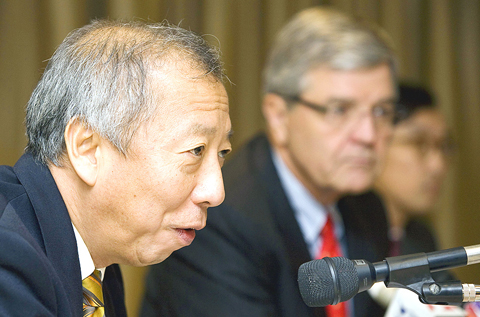The Oversea-Chinese Banking Corp (OCBC) yesterday announced the purchase of Dutch lender ING’s Asian private banking business, boosting Singapore’s share of the growing wealth management industry.
The US$1.46 billion cash deal turned OCBC into a major player in a sector that caters to rich individuals and families globally, including the expanding ranks of Asian millionaires seeking a safe place to park their money.
“We are very pleased to have the opportunity to acquire this valuable franchise,” OCBC chief executive David Conner said in a statement, noting that the bank was already established in the mass market.

PHOTO: BLOOMBERG
The assets bought by OCBC include Singapore-based ING Asia Private Bank Ltd and affiliates across the region and will boost OCBC’s presence in key markets including China, India, North Asia, the statement said.
OCBC will take over 5,000 ING clients with assets under management worth US$15.8 billion.
There will be minimal overlap with OCBC’s existing private banking business as less than 20 percent of the funds managed by ING are from Southeast Asia, the statement said.
The acquisition will more than triple the bank’s private client assets under management to US$23 billion and make it one of Asia’s leading private banks, the statement said.
Conner said OCBC was committed to ramping up investment in its private banking operations.
Macquarie Capital Securities banking analyst Tay Chin Seng said it was too early to assess the impact of the acquisition on OCBC’s bottom line.
“The question is how it would boost their business,” Tay said.
Another Singapore bank, DBS Group Holdings, was also bidding to buy ING’s Asian private banking business but announced on Tuesday it was pulling out of the race.
ING, which required a capital injection from the Dutch government to cope with the global crisis, had announced in April plans to sell assets worth up to 8 billion euros (US$11.83 billion) to reduce its risk exposure and focus on core businesses.
OCBC said Asia is the fastest growing private banking market in the world, with assets under management in the region projected to grow 12.8 percent a year between last year and 2013, higher than the global growth of 8.1 percent.
In Singapore, assets under management have risen from US$50 billion in 2000 to US$300 billion this year, the bank said.
A joint study issued on Tuesday by Merrill Lynch and financial consultancy Capgemini said Asia’s high net worth individuals — with investable assets of at least US$1 million — was forecast to grow 8.8 percent annually until 2018, faster than the global average of 7.1 percent.
The OCBC acquisition comes amid improving prospects for Singapore banks following the global financial crisis that began in the US housing market.

People can preregister to receive their NT$10,000 (US$325) cash distributed from the central government on Nov. 5 after President William Lai (賴清德) yesterday signed the Special Budget for Strengthening Economic, Social and National Security Resilience, the Executive Yuan told a news conference last night. The special budget, passed by the Legislative Yuan on Friday last week with a cash handout budget of NT$236 billion, was officially submitted to the Executive Yuan and the Presidential Office yesterday afternoon. People can register through the official Web site at https://10000.gov.tw to have the funds deposited into their bank accounts, withdraw the funds at automated teller

PEACE AND STABILITY: Maintaining the cross-strait ‘status quo’ has long been the government’s position, the Ministry of Foreign Affairs said Taiwan is committed to maintaining the cross-strait “status quo” and seeks no escalation of tensions, the Ministry of Foreign Affairs (MOFA) said yesterday, rebutting a Time magazine opinion piece that described President William Lai (賴清德) as a “reckless leader.” The article, titled “The US Must Beware of Taiwan’s Reckless Leader,” was written by Lyle Goldstein, director of the Asia Program at the Washington-based Defense Priorities think tank. Goldstein wrote that Taiwan is “the world’s most dangerous flashpoint” amid ongoing conflicts in the Middle East and Russia’s invasion of Ukraine. He said that the situation in the Taiwan Strait has become less stable

CONCESSION: A Shin Kong official said that the firm was ‘willing to contribute’ to the nation, as the move would enable Nvidia Crop to build its headquarters in Taiwan Shin Kong Life Insurance Co (新光人壽) yesterday said it would relinquish land-use rights, or known as surface rights, for two plots in Taipei’s Beitou District (北投), paving the way for Nvidia Corp to expand its office footprint in Taiwan. The insurer said it made the decision “in the interest of the nation’s greater good” and would not seek compensation from taxpayers for potential future losses, calling the move a gesture to resolve a months-long impasse among the insurer, the Taipei City Government and the US chip giant. “The decision was made on the condition that the Taipei City Government reimburses the related

FRESH LOOK: A committee would gather expert and public input on the themes and visual motifs that would appear on the notes, the central bank governor said The central bank has launched a comprehensive redesign of New Taiwan dollar banknotes to enhance anti-counterfeiting measures, improve accessibility and align the bills with global sustainability standards, Governor Yang Chin-long (楊金龍) told a meeting of the legislature’s Finance Committee yesterday. The overhaul would affect all five denominations — NT$100, NT$200, NT$500, NT$1,000 and NT$2,000 notes — but not coins, Yang said. It would be the first major update to the banknotes in 24 years, as the current series, introduced in 2001, has remained in circulation amid rapid advances in printing technology and security standards. “Updating the notes is essential to safeguard the integrity